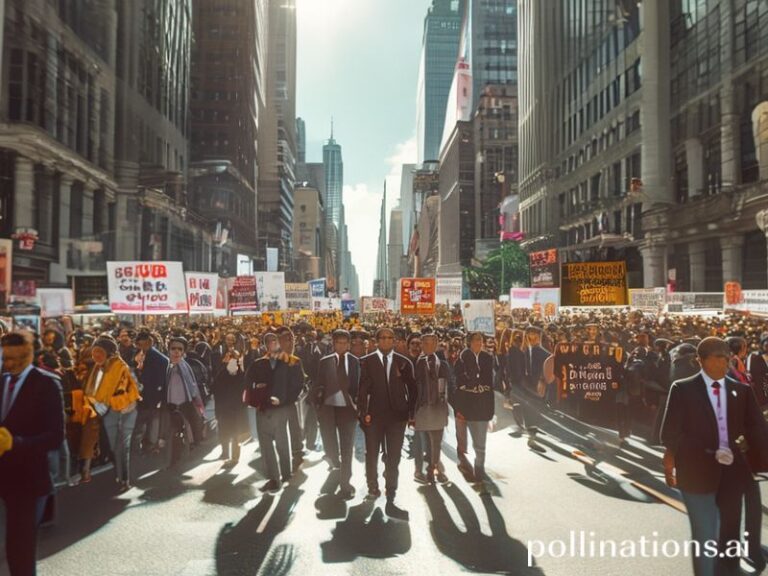New York vs Miami: When Soccer Becomes a Late-Capitalist Gladiator Match
New York City vs Inter Miami: A Proxy War for the End of Empire
Somewhere over the North Atlantic, the pilot of a Brussels-bound Airbus noses his jet south just enough that the passengers can glimpse a flicker of red and green below—two football clubs playing on a patch of grass that used to be a parking lot. The pilot, an Italian who once watched Maradona in Naples, mutters into the intercom: “Ladies and gentlemen, that glimmer is the 21st-century Cold War. Fasten your seat belts.”
And so it is. New York City FC versus Inter Miami CF is not merely a Major League Soccer fixture; it is the geopolitical equivalent of two rival hedge funds slapping each other with artisanal salmon at a charity gala. One club wraps itself in the star-spangled myth of Ellis Island, Wall Street, and the last functioning subway system north of Caracas. The other drapes itself in pastel linen, crypto wealth, and the existential dread of climate change lapping at its Ferragamo loafers. Pick your poison, comrade.
From the vantage point of a Cairo café where the espresso costs less than a New York minute, the match looks like a referendum on late-stage capitalism. New York’s roster, assembled via multinational holding companies that own half of Manchester and a slice of Abu Dhabi, represents the old guard: debt-financed skyscrapers, artisanal anxiety, and the faint smell of hot garbage in July. Inter Miami, meanwhile, is the nouveau-riche cousin who just discovered NFTs and thinks “liquidity event” is a personality trait. David Beckham, co-owner and walking LinkedIn profile, stands on the touchline like a Bond villain who’s misplaced his volcano.
Europe, still pretending the Champions League is the center of the universe, watches with the detached amusement of an elderly duchess observing TikTok. The Bundesliga sends scouts who scribble “MLS: good cardio, questionable defending, excellent coffee.” Parisian intellectuals debate whether this is American cultural imperialism or merely post-imperial karaoke. In Lagos, where the power grid flickers like a metronome, supporters’ clubs stream the match on cracked Android screens and argue whether Messi’s final cameo is a metaphor for declining U.S. hegemony or just good business.
Global brands understand the stakes. Adidas sees a runway for limited-edition sneakers inspired by Art Deco lifeguard towers. Apple TV calculates the precise number of drone shots needed for a dystopian montage. Even the Vatican weighs in—unofficially—when a bishop tweets that the match “illuminates the tension between vertical ambition and horizontal hedonism.” The tweet is later deleted, but screenshots are forever.
The game itself? A 2-2 draw that feels like a TED Talk scripted by Samuel Beckett. Miami’s high press resembles a hedge fund’s quarterly earnings call: frantic, loud, and ultimately inconclusive. New York’s midfield, staffed by a Dane on loan from Utrecht and a Ghanaian who once rejected Barcelona for “cultural fit,” passes the ball as though it carries both monkeypox and student-loan debt. In the 78th minute, Messi ghosts past three defenders, scores, and immediately checks his watch—presumably to see how much stoppage time remains before his contract extension triggers a cryptocurrency clause.
When the final whistle blows, nobody leaves happy, which is the surest sign of authenticity in modern sport. New York fans lament the absence of a proper stadium—currently a pop-up venue in Yankee Stadium’s parking lot, because nothing says “world-class city” like tailgating beside a monument to 1920s concrete. Miami fans file out discussing whether tonight’s humidity justifies relocating the franchise to Montreal. Somewhere in Qatar, a sheikh refreshes his Bloomberg terminal and smiles: the empire is still for rent, cash or crypto accepted.
And somewhere over the Atlantic, the same pilot banks north, back toward Brussels, muttering the universal epitaph for our age: “They played, they tweeted, the sea level rose. Same time next week?”







